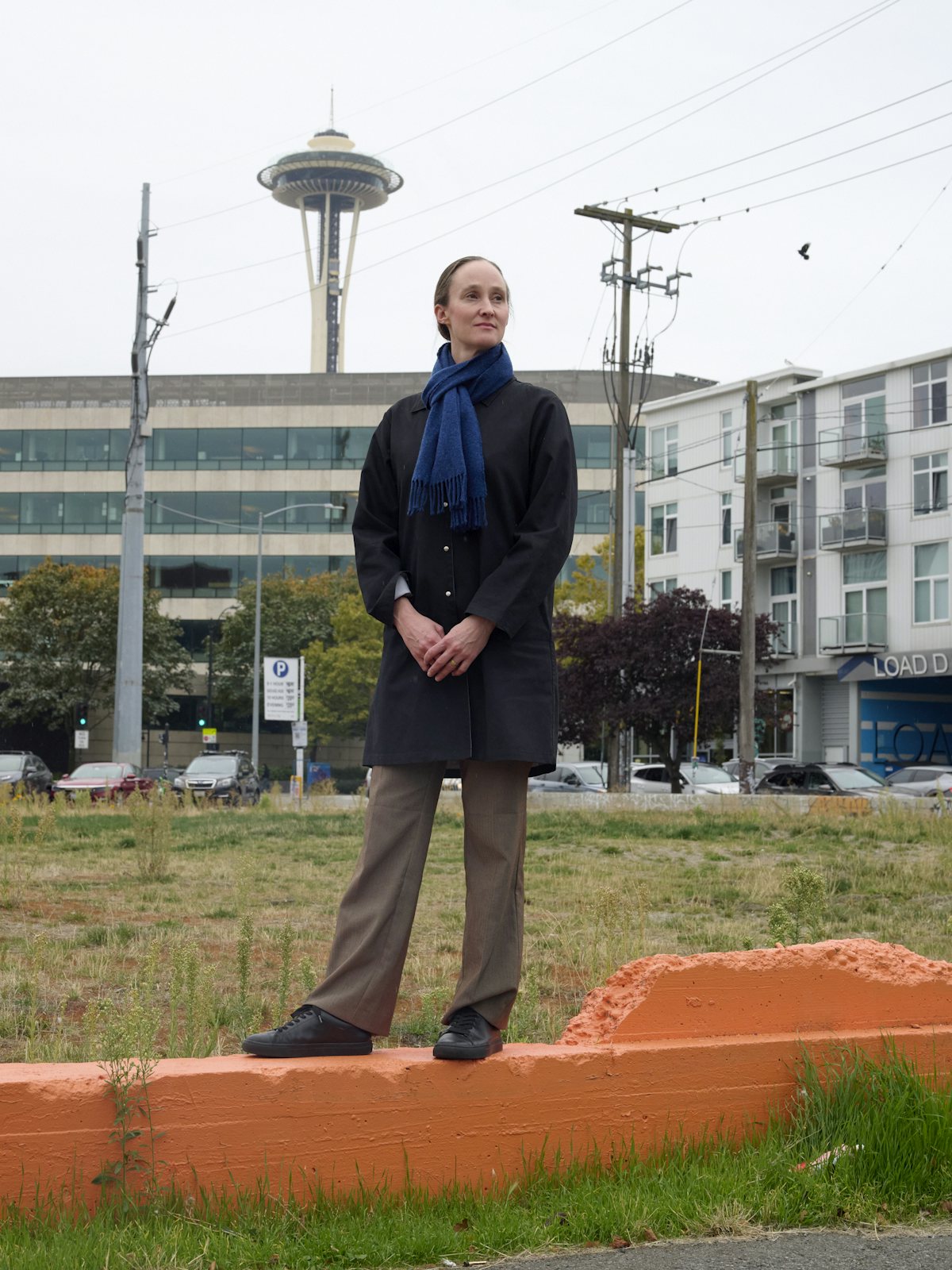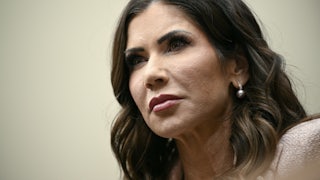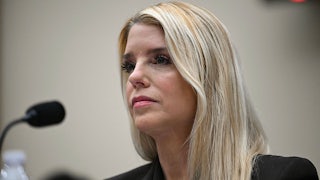The workers at Pike Place Market in Seattle, who call themselves Market Rats, learned over the summer that someone increasingly famous around town used to be one of them: Upstart mayoral candidate Katie Wilson, 43, used to busk at Pike Place, where she played guitar and harmonica. Not exactly a co-worker, but certainly a member of their tribe (or colony, as it were). “You know, sort of hometown hero vibes,” Emily Pike, who works at two bookstores in the market, told me. “And the thing about the market is it’s a very tight community.” So the Rats decided to throw Wilson a party on a recent Friday evening, in the home stretch of her surging campaign to unseat incumbent Mayor Bruce Harrell—who, like Wilson, is a Democrat.
Many of the shops in the market were closing or already closed. A worker hosed down the street out front, dispersing the slightly fishy smell into the damp night. Cheers for the Mariners, then in the playoffs, filled the air from bars and restaurants. And then Wilson arrived, her smile betraying a hint of weariness, like it had been a long day. She wore a familiar outfit—slacks, sensible shoes, a simple blouse—and her brown hair was pulled back in a bun as usual, but with a twist: a rat-ears headband made specially for the party.
To kick things off, a guitarist sang “All You Need Is Love,” and a duo wearing cat masks played a European-folk version of “We Are the Champions” on a violin and an accordion. The crowd sang along. After some introductions, Wilson spoke. “Seattle should be a city where you can busk at Pike Place Market and afford to live here,” she told the group. “What we lose when it becomes this kind of pressure cooker where you have to have a tech job in order to survive is so profound, right? It becomes a city that’s more sterile. It becomes a city that’s more alienated. We lose that community.”

Seattle used to be a vibrant, affordable city for young adults, where you could make a decent living working at bookstores, playing music, waiting tables, or working at Pike Place. But that was changing by the time Wilson moved there in 2004. The tech sector was ascendant, with Microsoft on top but Amazon plotting its growth from an online bookstore to a web-services and everything-marketplace behemoth. From 2003 to 2023, the number of millionaires in the city increased 72 percent, and the median home price tripled. The Market Rats can’t afford Seattle anymore—and neither can a lot of people under 40 who, despite having a college degree, are struggling to stay above water.
Wilson, who leads in the polls ahead of next Tuesday’s election, has been compared in the national press to another young, left-wing candidate for mayor: Zohran Mamdani in New York City. That’s understandable, if imperfect. Both are running to the left of establishment Democrats and have been endorsed by the Working Families Party, which organizes more progressive candidates inside the Democratic Party; both are centering their campaigns on affordability issues. But they came up in politics through different paths and are relying on different strengths. Mamdani is a state representative, while this is Wilson’s first political campaign. And there are some clear stylistic differences. In a social media post last month, Wilson contrasted herself to the “charismatic, telegenic and stylish” Mamdani, saying, “I … am deeply awkward, not going to win any beauty pageants, and honestly I’ve spent my whole adult life looking really dumpy.” (That is too harsh, but she does come across as unfussy.)
What unites them is their audience. The new Democratic base is made up of college graduates, increasingly millennials and Zoomers who moved to the country’s biggest cities for jobs that aren’t getting better or more stable as they age. Even a middle-income salary doesn’t guarantee the financial security and lifestyle that their parents and grandparents had. “There’s a fair number of people who are well educated but not earning the incomes that they might have expected or that would be commensurate with their education,” said Mark A. Smith, a political scientist at the University of Washington. “So you might call these the well-educated but financially struggling set. And I think that’s a lot more people than is commonly understood.”
While much of the Democratic Party and liberal media wrings its hands over the loss of rural voters to the MAGA-pilled Republican Party, it’s this base that is demanding the party take a braver, more radical approach to economic issues, and is challenging the establishment for leadership roles in cities across the country. The Seattle and New York races—along with mayoral races in Minneapolis, Albuquerque, and Buffalo—make clear that Democratic leaders ignore these voters at their own peril. Initially seen as a long-shot candidate, Wilson won Seattle’s nonpartisan “jungle” primary in August with more than 50 percent of the vote, besting Harrell by 10 points. Now they’re going head-to-head in a runoff election that will reveal just how powerful the new young urban left has become.
Wilson did not whip out her guitar and harmonica at the Pike Place party, but she did perform at Candidate Survivor, an annual talent show open to candidates for city office. Wilson’s dad, David Sloan Wilson, got emotional when he talked about watching her there. “She wasn’t super talented, but that was the charm of it,” he said. “She wasn’t afraid to do it.” He said she had embraced not being the best and was willing to try anyway. “That’s something I could never have done,” he said.
That is a good metaphor for Wilson’s campaign. After a career as a community organizer, championing legislation from the sidelines, she was unafraid to make an earnest bid to run the biggest city in Washington state.
Wilson grew up in upstate New York. Both of her parents are research biologists. Her father is well known for studying the evolutionary advantages to altruism, or why and how organisms benefit from helping others. He has become more involved in his community later in life, but when Wilson was a child he was exclusively “inside the ivory tower,” he told me.
That may have influenced Wilson later. She studied physics and philosophy at Balliol College, Oxford University, but left before earning her degree. She says she saw academic work as at odds with activism. “I think I had in my mind at that time a little bit of a kind of dichotomy between the ivory tower and the real world, which is not necessarily the way that I think of it now,” she said. “And so, it was kind of a decision to jump into the real world and see and make my way there.”

Still, she has what her father calls an academic approach to problems. She and her future husband, Scott Myers, traveled around the country on Greyhound buses and settled on Seattle, in part, because the University of Washington had an open library system and they could join for $100 a year. This new life provided less structure than she was used to. “Psychologically, it had this effect on me of just … kind of being at sea, the world’s not really set up for you, and you have to kind of figure it out as you go along,” Wilson said.
In addition to busking at Pike Place Market, Wilson tried out other jobs. At an event with a local comedian, Brett Hamil, after the Market Rat Party, Wilson said she’d gotten into construction after working on boats.* “I was working down at a boatyard … and I got the chance to put together a whole bunch of workbenches, and I realized that I really loved swinging a framing hammer,” she said, still wearing her rat ears. That led to work helping to convert studios to one-bedroom apartments so that the building’s owner could charge more rent. “And it was real shady,” she said.
During the campaign she has received financial help from her parents for her daughter’s childcare. Harrell’s campaign has used this to attack her. “Wilson, who campaigns on issues of affordability, but chose to not graduate from college and chooses to rely on parental subsidy to avoid financial hardship, either cannot or will not cite the total amount of money she receives from her parents,” Marta Johnson, Harrell’s campaign manager, said in an email. (Asked if her twenties and thirties were enabled by privilege, as Harrell contends, Wilson told me, “Sure, of course.”)
She and Myers had already been involved in some of the antiwar, anti-globalization protests in the late 1990s and early 2000s, and she felt she wanted hands-on experience, and to really study how to create change. “Just seeing those hundreds of thousands of people pouring out into the street and being like, ‘Oh, things are really going to change now, right?’” she said. “And then, kind of seeing those movements fail to accomplish what people had hoped. And so, I think when we moved to Seattle, we were already interested in kind of cracking that nut of: How do we actually organize and build power that can be effective in in moving the needle?”
In 2011, in the aftermath of the Great Recession, Seattle contemplated cuts to some of its Metro bus service, and Wilson, Myers, and other activists decided it was their moment. “We decided, ‘OK, well, let’s jump in and organize transit riders,’” she said. “I would call that period leading up to when we and others founded the Transit Riders Union as kind of like studying, working, getting, gaining experience of the world, but not like super active politically in Seattle at that point.”
The union began organizing city residents to campaign against the cuts, which the county did not make in the end, and ultimately won increased funding for a reduced fare program. They also lobbied bigger businesses to subsidize public transit for their employees, in part as a way to combat climate change by reducing dependence on cars. But the union aspires to much more, describing itself as “a democratic organization of working and poor people … taking control over our own lives, and building up the power we need to change society for the good of humanity and of the planet.” (Initially all-volunteer, the organization now has a small budget of around $200,000, from membership dues, with larger gifts from labor unions, and pays Wilson a sub-$100,000 salary as its general secretary.)
Sarah Baker, who’s 36 and on the Pike Place Market’s Historical Commission, said she remembered Wilson from when she visited her community college and organized students around bus transit. “It was just such a standout memory,” she said. “And so, when I was like, ‘Oh my God, she’s running, fuck yeah!’ Like she fucking knows the city. She knows the people. Of course, I’ll support her.” Wilson has also led the Transit Riders Union to join other coalition campaigns, including helping to pass a 2020 payroll tax initiative on the city’s large employers, raising the minimum wage in communities around Seattle, and successfully fighting for more protections for renters.
On the campaign trail, Wilson speaks with a detailed wonkiness on the issues she’s passionate about. In addition to improving mass transit, her platform leans heavily on sheltering the unhoused: She has pledged to open 4,000 new emergency shelter units in four years, and to fully fund the first 18 months of operations for Seattle’s new social housing developer, which she has accused Harrell of slow-walking. She also voices familiar progressive goals like protecting the city from the Trump administration and addressing climate change.
Still, running a city with a nearly $9 billion budget would be a big jump, and is something Harrell has continually attacked her on. Her biggest supporters seem unbothered—her modest income, and the help she receives from her parents—make her relatable to struggling millennials and Zoomers. But she’ll need more than young, politically engaged voters to win the general election, and that means convincing the broader electorate that she’s capable of more than just advocacy.

In past elections, Wilson’s background would have made her candidacy a nonstarter, and it’s clear that Harrell’s campaign still thinks it should be. Harrell, 67, has a more traditional political pedigree: He played football at the University of Washington before going to law school and serving on the City Council from 2008 to 2020. In 2021, in his second try for the mayorship, Harrell won by a whopping 17 percent and became the city’s first biracial Black and Japanese American mayor. He ran as a moderate on a platform that was heavy on public safety: He promised to hire more police officers and reduce visible homelessness by clearing tent encampments and increasing shelter beds. He’s established a Unified Care Team that has cleared encampments but has been less successful at referring unsheltered residents to permanent or temporary housing. Seattle has actually lost shelter capacity during Harrell’s tenure.
Traditionally, being the mayor of a big American city entails courting businesses and major employers to ensure enough jobs and a robust tax base. With enough revenue coming in, the city practically runs itself: Public services continue to be fully funded, and public goods are maintained or incrementally improved. With a surplus of revenue, the city can provide a little more than usual, and with a deficit, the city tightens its belt a little. But if big change is needed, it happens slowly and steadily.
“Progress often takes time,” Harrell told me. “I just have to remind people that sustainable change does take time. But I’m a mover and shaker too.”
To progressive voters, though, this slow-and-steady approach has failed in the Trump era. In Seattle, voters feel that Harrell, whose backers include real estate and other moneyed interests, is ignoring or even subverting their desires—especially when it comes to housing.
In 2023, the city’s voters passed a social housing bill that created a public development authority to build, operate, and maintain permanently affordable housing for families up to 120 percent of the median income. In February, the same groups that championed the initiative helped get another initiative on the ballot that proposed a new tax on corporations for every Seattle-based employee paid more than $1 million a year. Harrell and many City Council members supported an alternative that would have shuffled money from an existing payroll tax and funded housing for families making up to 80 percent of the area median income, which is how Seattle’s current public and affordable housing programs, like those in many other cities, already work.
By all accounts, Harrell dragged his feet after the first measure passed. The agency only has one staff member and hasn’t been able to acquire lots or start projects. Harrell proposed, and the council approved, a $2 million loan to the developer in July, just before the primary he lost to Wilson. “The mayor still has not fulfilled the 18 months of in-kind startup support that was required in our first initiative,” said Tiffani McCoy, co-executive director of House Our Neighbors, the group that got the initiative on the ballot. “But what they said was, it was a more responsible way, that they wanted to give this thing starter money and see proof of concept.”
This is why Wilson said she decided to run. “I thought of my role as being an organizer on the outside, like helping people to come together, and felt like they weren’t represented at City Hall,” she said. After voters passed the corporate tax in a landslide in February, despite opposition from Amazon, Microsoft, and Harrell, Wilson worried no one else would champion the cause voters cared so much about. “It’s really important that we make social housing work, and we need a mayor’s office that’s going to fight to make it work and not try to undermine it.”
In addition to adding 4,000 emergency units for the homeless, Wilson has promised to jump-start the new Seattle Social Housing Developer, the entity created by the 2023 initiative, by giving it the technical support and startup funds it needs, while also pursuing a $1 billion bond to build affordable housing and ensuring more protections for renters. Harrell has said that pursuing these goals so quickly would jeopardize the city’s other initiatives and needs. “This is a complex issue,” he said at a candidate forum I attended in October, after Wilson brought up her plan. “This is a crisis, and everyone wants to solve it, and we have excellent people at the city trying to do this work.”

On a recent Sunday night, at a campaign fundraiser at a wine bar in the trendy, diverse neighborhood of Capitol Hill—it has bike lanes and rainbow-painted crosswalks—Wilson met some voters who might be receptive to Harrell’s experience and more cautious approach. While the event drew plenty of relatively young people, including some who knew Wilson from the Transit Riders Union, others told me they didn’t know much about her—and many were small-business owners who wanted to know that Wilson cared as much about building sustainable businesses and bringing in clientele as she did about affordable bus fares.
Almost everyone I asked about Harrell began their response with a similar statement. “He’s not terrible …” But it was clear that they wanted more—more promises, more action, something different. They also felt he was out of reach, mostly responsive to his rich friends and too difficult for regular city residents to talk to. Even the city workers’ union, Protec17, has endorsed Wilson, along with other progressive candidates running for City Council.
Though Wilson is slightly ahead in recent polling, it’s a tight race. But it’s not surprising that Harrell is struggling in his attempt at a second term: The city has, in the past 15 years, been particularly hard on its mayors. No incumbent has won a second term since 2005. I asked Wilson what she thought she had to deliver if she won, and she said she had to make a dent on homelessness more than any other issue.
If Wilson wins, her challenge will be to make changes faster than Harrell has done, while acknowledging that success won’t happen overnight. “I think that the affordability crisis of the last few years has kind of brought that to a fever pitch where people have not felt that their elected leaders are actually fighting for them, actually fighting for affordable housing, for affordable childcare, for the things that are affecting them day to day,” Wilson told me. “And the failure of a certain brand of Democratic Party politics to stop Trump’s election … it’s like, OK, now we see that the government can move fast. It can do some really bad things really fast. So why can’t it be some good things?”
This article has been updated to clarify the financial help Wilson receives from her parents.






